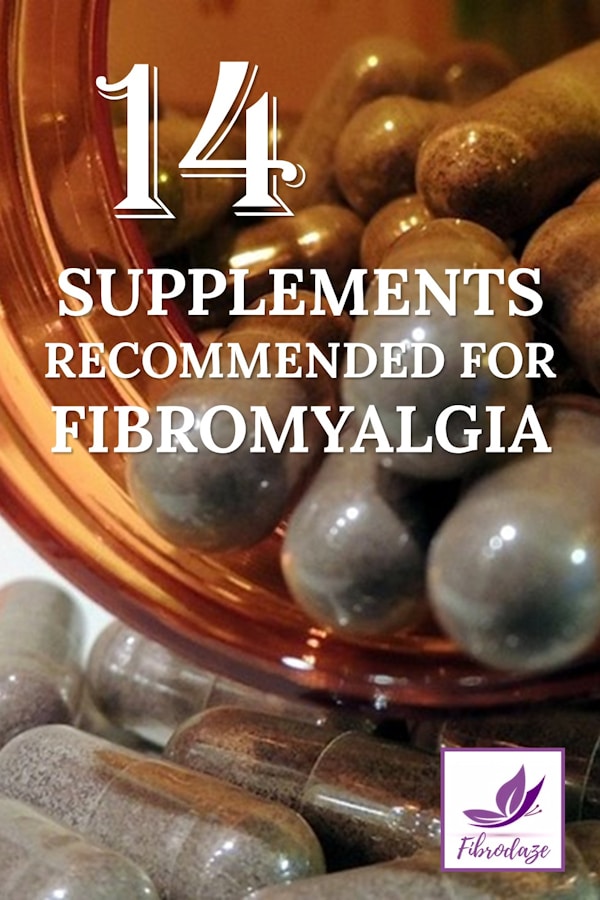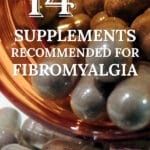There are different supplements that have a role in the treatment of Fibromyalgia Syndrome. Supplements can help correct nutritional deficiencies, reduce pain and inflammation, increase your energy and help you get a good night’s sleep.

Vitamins, minerals, amino acids, and essential fatty acids provide the building blocks you need to get well and stay well. The body knows what to do with them and depends on them for survival.
The following supplements have either been linked to symptom improvements or recommended by experts to overcome deficits that are common among fibromyalgia patients:
- 5-HTP (5-hydroxytryptophan) helps raise serotonin levels in the brain. Clinical trials have shown that 5-HTP supplementation in fibromyalgia patients is associated with improvements in anxiety, pain intensity, quality of sleep, fatigue, and the number of tender points. If you take antidepressants, you should not take 5-HTP.
- SAM-e (S-adenosylmethionine ) is a compound that occurs naturally in the body. It is needed for proper immune function, and assists in the production and breakdown of neurotransmitters such as serotonin, norepinephrine, and dopamine. SAM-e has been shown to relieve depression and the chronic pain associated with osteoarthritis. Some studies show that taking SAM-e may reduce fibromyalgia symptoms of pain, fatigue, and stiffness. People taking antidepressants should not use SAM-e without first consulting their doctor.
- Magnesium have been found to be effective in relieving the symptoms of FMS. Magnesium is essential to healthy muscle function, it increases cellular energy, reduces pain, and enhances immune function. Magnesium is also a natural muscle relaxant and critical for the relief of muscle pain.
- Malic Acid is the organic compound found in tart fruits such as Granny Smith apples, certain grapes, and cranberries. Malic acid may help muscle tissues get more oxygen, improve energy production in the muscle cells and prevent muscle tissue breakdown. Most fibromyalgia patients need to take as much as 1200 milligrams of malic acid, twice per day, coupled with 300 milligrams of magnesium, also twice per day.
- Vitamin D may reduce the symptoms of fibromyalgia by lowering inflammation. Vitamin D reduces cytokine production. This protein causes inflammation. Some studies have reported that some people with fibromyalgia have a vitamin D deficiency.
- CoQ10 (Coenzyme Q10) is a fat-soluble nutrient which is produced naturally in our bodies. It is found in every cell in the body, but is most concentrated in organs that require the most energy — such as the heart, liver, muscles and kidneys. Researchers believe that low CoQ10 levels may play a role in the development of fibromyalgia symptoms because:
- CoQ10 has been found lacking within the blood cells of many fibromyalgia patients, and
- CoQ10 supplementation (300 mg daily for 9 months) has been linked to a significant improvement in symptoms in a small preliminary trial.
- B Complex Vitamins are necessary for healthy function of blood, brain, and nerve cells which are vital for sustained energy. B vitamins are part of a family that includes thiamin (B1), riboflavin (B2), niacin (B3), pantothenic acid (B5), pyridoxine (B6), biotin (B7), folic acid (B9) and cobalamin (B12).Deficiencies in these vitamins can lead to many of the symptoms involved in Fibromyalgia. As the various B vitamins actively work together, a deficiency in one can lead to deficiencies in others and a variety of problems.
- Omega-3 fatty acids reduce the body’s production of inflammatory hormones, which can help reduce fibro pain, stiffness and tender points. Omega-3 fatty acids from fish oil can lower blood pressure and triglyceride levels. Omega-3 supplements are used to help prevent and treat a number of serious diseases.
- Ribose is a naturally occurring simple sugar found in all living cells. It is the fuel that mitochondria use to produce adenosine tri-phosphate (ATP), which provides the body’s cellular energy. Studies show that patients with fibromyalgia, chronic fatigue syndrome (CFS) and congestive heart failure are low in D-Ribose. Recommended dose for fibromyalgia and CFS is five grams, three times a day.
- NADH is a powerful cellular energy producer. Research has demonstrated the ability of supplemental NADH to promote fatigue reduction, enhanced mental clarity, and increased levels of important neurotransmitters like dopamine.
- Acetyl-L-carnitine is a vital amino acid which aids memory and proper brain function. In addition to helping sharpen mental focus and concentration, L-carnitine plays a key role in energy production. In fibromyalgia studies, it’s been shown to lower pain levels and improve mental health. Take Acetyl-L-Carnitine 500 mg twice a day for at least 4 months.
- DHEA (dehydroepiandrosterone) is a hormone that’s naturally produced by the adrenal glands. Studies show that DHEA supplementation can help people with adrenal insufficiency and mild depression. The recommended dosage of DHEA is typically between 25 and 50 mg per day.
- Probiotics are often a used to relieve the IBS symptoms that afflict most fibromyalgia patients. Some researchers claim that up to 70% of the immune system’s activities occur in the digestive tract. Probiotics appear to play a significant role in supporting the immune system.
- Melatonin is a natural hormone found in the body, thought to be involved in promoting sleep. Melatonin is often used as a sleep aid, but it has also been used for depression, chronic fatigue, and fibromyalgia. Take 0.5 – 3 mg, once daily before bed, for sleep and immune support.
I personally take all of the above supplements, plus a multi-vitamin and milk thistle for my liver. Since going off all prescription medications and starting this regiment of supplements, I have lost 30 pounds. I sleep better and have more energy.
Remember to check with your doctor to make sure a particular supplement is safe for you and follow these safety guidelines when buying supplements.
Pin for Later






Anne from Rochdale UK says thank you all, this is fascinating and useful. The latest supplement for me is Magnesium in gel form recommended for muscle pain and sleep disorders. It does seem to help take the edge off both. The gel I read about is called Original Pure mineral gel Magnesium by BetterYou.
Best wishes to all, MA Wilson.
Hi, Anne. A magnesium gel is great for spot treatments. I use it every day.
Hi there, Sue! This is a great post, thank you!!! I do have one question, though: can you outline WHEN and HOW MUCH you take each day? I would LOVE to try your regimen, but need some guidance on exactly how you take each supplement, and at what time of day/with or without food!? Thank you in advance!
Thank you. I take most of my supplements in the morning with a smoothie. And some at night before bed. I am writing a post that will tell you exactly what I take, the dosage, and when I take them. It should be done next week.
Of you take a probiotic you should take a prebiotic because probiotics die in the gut without prebiotics